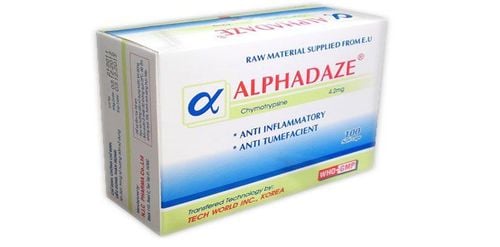This is an automatically translated article.
Ifetab has the main active ingredient Ibuprofen, which belongs to the group of non-steroidal anti-inflammatory drugs. So what is Ifetab drug and how to use it?
1. What are the uses of Ifetab?
What are the uses of Ifetab? Ifetab is a product of US Pharma USA Co., Ltd (Vietnam) with the main active ingredient Ibuprofen 400mg. Ifetab is prepared in the form of film-coated tablets for oral use, packaged in a box of 1 bottle containing 200 pills.
Ibuprofen in the drug Ifetab belongs to the group of non-steroidal anti-inflammatory drugs, chemical structure is a derivative of Propionic Acid. The effects of Ibuprofen are similar to those of other nonsteroidal anti-inflammatory drugs, including analgesic, antipyretic, and anti-inflammatory. The mechanism of action of Ifetab is to inhibit the enzyme prostaglandin synthetase, thereby preventing the formation of Prostaglandin, Thromboxan and other products of the enzyme cyclooxygenase. Note Ibuprofen also inhibits the synthesis of prostacyclin in the kidneys, so when used there is a risk of causing fluid retention by reducing blood flow to the kidneys. Physicians should pay attention to this effect of Ibuprofen when prescribing Ifetab for people with renal failure, heart failure, liver failure or diseases with disorders of plasma volume.
Ibuprofen is considered the safest of the non-steroidal anti-inflammatory drugs available today.
2. Indications and contraindications of Ifetab
Ifetab is indicated for use with the following purposes:
Pain relief and relief of mild to moderate inflammation in some conditions such as dysmenorrhea, headache, pain after dental or vulvar surgery; Use Ifetab to reduce the dose of narcotic pain medication used to treat pain after major surgery or cancer pain; Ifetab is used in the treatment of certain bone and joint conditions such as rheumatoid arthritis in adults or adolescents; Fever in children. However, the use of Ifetab drug is not done in the following cases:
Patients with hypersensitivity to Ibuprofen or its components; Patients with active peptic ulcer disease; History of symptoms of hypersensitivity to aspirin or other non-steroidal anti-inflammatory drugs (including asthma attacks, rhinitis, urticaria...); Dengue patients should not use Ifetab because Ibuprofen can cause excessive hypothermia; Patients with bronchial asthma or diseases causing bronchospasm, bleeding disorders, cardiovascular disease, history of peptic ulcer, liver or kidney failure (glomerular filtration rate less than 30 ml/min); The patient is being treated with coumarin anticoagulants; Patients with congestive heart failure, with decreased circulating volume due to diuretics; Have gum disease; Women in the last 3 months of pregnancy.
3. Dosage of the drug Ifetab
Recommended dose of Ifetab for adults:
Usual dose for pain relief: 1.2-1.8g/day (3 divided 4.5 Ifetab tablets), divided into several oral doses. However, most patients can effectively relieve pain at doses of 0.6-1.2g/day (1.5 to 3 Ifetab tablets) have been effective. In case of necessity, the maximum dose of Ibuprofen can be increased to 2.4-3.2g/day (6-8 tablets of Ifetab); Rheumatoid arthritis patients may require higher doses of Ibuprofen than patients with osteoarthritis; The recommended dose of Ifetab for fever reduction is 200-400mg (0.5-1 Ifetab tablets), taken every 4-6 hours until the maximum dose is 1.2g/day. Recommended dose of Ifetab for children:
The usual analgesic or antipyretic dose is 20-30mg/kg/day in divided doses, up to a maximum of 40mg/kg/day in the treatment of rheumatoid arthritis. years; Ifetab is not recommended for use in children weighing less than 7 kg and the maximum daily dose is 500 mg for pediatric patients weighing less than 30 kg. To avoid excessive accumulation of Ibuprofen in the body, patients should reduce the dose of Ifetab in patients with impaired renal function. However, the safety of Ifetab in patients with renal impairment has not been established.
4. Side effects of the drug Ifetab
Some common side effects when using Ifetab include:
Fatigue; Abdominal bloating, nausea, vomiting; headache, dizziness, lightheadedness or restlessness; Itching, skin rash. Uncommon side effects of Ifetab:
Allergic reactions, especially bronchospasm in asthmatics), rhinitis, urticaria; Abdominal pain, gastrointestinal bleeding or worsening of peptic ulcer disease; Drowsiness, insomnia, tinnitus; Visual disturbances, hearing loss; Prolong bleeding time; Edema, rash, Stevens Johnson syndrome or hair loss (rare); Depression, aseptic meningitis, blurred vision, color vision disturbances or decreased vision due to drug poisoning (rare); Decrease in the number of white blood cells, platelets, red blood cells (causing anemia) or decrease in neutrophils and eosinophils; Gallbladder contractility, abnormal liver function tests or patients with hepatotoxicity; Cystitis, hematuria; Acute renal failure, interstitial nephritis; Nephrotic syndrome.
5. Ifetab drug interactions
Ifetab drug interactions may occur during use as follows:
Ifetab combined with Quinolone antibiotics can increase the side effects of Quinolones on the central nervous system, even leading to convulsions. . Magnesium hydroxide increases the initial absorption of Ibuprofen, however, when aluminum hydroxide is added, no interaction has been observed. Concomitant use of Ifetab with other nonsteroidal anti-inflammatory drugs increases the risk of gastrointestinal bleeding or ulceration. Methotrexate: Ibuprofen may increase the toxicity of methotrexate, so the concomitant use of Ifetab with Methotrexate should be avoided. Ibuprofen may reduce the diuretic effect of furosemide and other diuretics. Digoxin: Ibuprofen may increase plasma digoxin concentrations, therefore caution should be exercised when Ifetab is combined with Digoxin. Oral anticoagulants, injectable heparin and ticlopidine when used concomitantly with Ifetab increase the risk of gastrointestinal bleeding.
6. Some notes when using Ifetab
Some notes when using Ifetab to treat diseases are as follows:
Be careful when prescribing Ifetab for elderly patients. Ibuprofen can increase levels of liver transaminases, but this problem is usually transient and reversible. Visual disturbances such as blurred vision are subjective and are related to the adverse effects of Ifetab but resolve upon discontinuation of Ibuprofen. Drivers and operators of machinery should be aware of the risk of dizziness when using Ifetab. Nonsteroidal anti-inflammatory drugs can inhibit uterine contractions and slow labor. At the same time, the NSAID group of drugs also has the side effect of causing severe pulmonary hypertension and severe respiratory failure in neonates due to premature closure of the ductus arteriosus in utero. Patients using nonsteroidal anti-inflammatory drugs (such as Ifetab) are at increased risk of low amniotic fluid and anuria in the neonate. During the last 3 months of pregnancy, pregnant women need to limit the use of any anti-inflammatory drugs. This ifetab is absolutely contraindicated in this case, especially a few days before delivery. Ibuprofen passes into breast milk very little and insignificant amounts. Therefore, Ifetab is unlikely to cause harm to a nursing infant when the mother's dose is consistent with the recommendations. Ibuprofen is a non-steroidal anti-inflammatory drug with the active ingredient Ibuprofen. The drug has an effective analgesic, antipyretic and anti-inflammatory effect. To ensure the effectiveness of use, patients need to carefully read the instructions and consult the doctor, pharmacist for advice on how to use and the most effective dose.
Follow Vinmec International General Hospital website to get more health, nutrition and beauty information to protect the health of yourself and your loved ones in your family.













